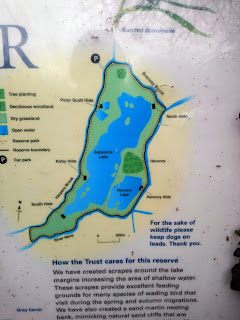This large, ex-gravel pit is made up of a main lake with gently sloping banks, shallow areas of water and ponds, low lying islands, a large scrape and a fringe of reeds surrounded by grassland and wet woodland. This is ideal habitat for wintering birds: Goosander, Wigeon and Gadwall reach nationally important numbers, joined by large numbers of roosting lapwing and golden plover.
 |
Wading birds use the scrape and the shallow lake margins. Oystercatcher, ringed plover, little ringed plover and Redshank stay to breed, while Whimbrel, Turnstone and common Sandpiper often pass through during migration. Numerous pairs of common tern nest in a colony on the islands.
Time to complete a circuit (just over two miles) before the Starlings are likely to arrive. Some interesting black goats grazing amongst the fallen leaves. There is also a Great White Egret carefully wading around the waters edge.
The Murmuration happens during the winter months, roughly from October to March. The peak in numbers is usually December to January when more birds come over from Europe and join our resident birds.
It's basically a mass
aerial stunt - thousands of birds all swooping and diving in unison.
It's completely breathtaking to witness. It is thought that Starlings
do it for many reasons. ... They gather over their roosting site, and
perform their wheeling stunts before they roost for the night.
It wasn't long before a large gathering of birds had congregated. Swooping and diving in synchronisation it is an incredible sight. The noise they make as they fly overhead is amazing too. It really does make the old hairs on the back of the neck stand up! After about 10 minutes as soon as one goes down they all go down and it is over.
 |
 |
Although Starlings are not the only birds that do it, a murmuration is a term more specifically used for starling flocks. Starlings use murmuration to confuse predators and to keep warm.
Murmuration comes from Medieval Latin murmuratio (“murmuring, grumbling”). The "starling" sense is probably derived from the sound of the very large groups that starlings form at dusk.
I reckon the must have been a minimum of 10,000 Starlings and what a performance they produced!














No comments:
Post a Comment